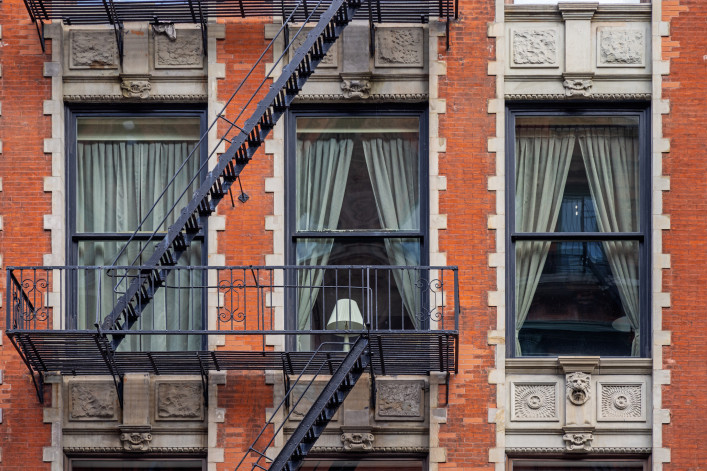NYC real estate firm fined $260,000 for charging sky-high broker fees
- City Wide Apartments must pay a $50,000 fine, plus $210,000 to dozens of renters
- A $20,000 commission for a rent-stabilized apartment caught the eye of investigators

The Department of State's Licensing Services Division found City Wide's exorbitant broker fees did not "reasonably relate to legitimate services."
iStock
Sky-high broker fees drew headlines last year, but this year, they’re drawing fines.
New York’s Department of State reached a settlement with a New York City brokerage to pay $260,000 in penalties for charging “excessive” broker fees, including a $20,000-plus commission on a rent-stabilized Upper West Side apartment in 2022, as first reported by the New York Post.
City Wide Apartments agreed to pay a $50,000 fine, $210,000 to the dozens of renters who coughed up the high fees, and to change its business practices, according to Governor Kathy Hochul’s office.
The Department of State’s Licensing Services Division started investigating City Wide’s broker fees in 2022, following the Post’s story, and found that City Wide broke the state’s real property law because the fees did not “reasonably relate to legitimate services” provided to the renters.
“Excessive brokers’ fees add substantial costs to the already high price of renting property,” New York State Secretary of State Robert J. Rodriguez said in a statement. “For those who think they can take advantage of tenants seeking housing, you can rest assured the Department will hold them accountable.”
City Wide did not immediately respond to a request for comment.
A surprising settlement
The settlement is surprising because there are no legal caps on broker fees, says Jennifer Rozen, managing attorney at Rozen Law Group. But the Department of State says it can punish brokers for charging “exorbitant” fees above the industry standard of around 12 to 15 percent of a year’s rent.
There is no one price point that would automatically qualify as an overcharge, according to a spokesperson for the Department of State. Instead, commissions above the industry standard that are not related to the services actually provided by the broker could be considered “exorbitant.”
“A broker’s fee must represent charges for actual services provided,” reads the governor’s announcement of the settlement. “Real estate licensees are obligated to act with honesty in their dealings with the public and cannot charge exorbitant commissions that have no reasonable relationship to the work involved in earning the commission.”
Legislative efforts to curtail high fees
While rare, the spokesperson says the department has disciplined brokers for overcharging renters since the 1970s. And there have also been attempts to limit broker fees in the past.
Legislation proposed in 2019 tried to limit broker fees to one month’s rent. But attempts to curb fees have been struck down in court, following lawsuits and opposition from the real estate industry.
Most recently NYC Council member Chi Ossé proposed legislation that would require whoever hired the broker to pay their fee. The bill would represent a significant change, as renters tend to cover the fee even if the landlord hires the broker. The legislation failed to pass in the 2023 session, but Ossé previously told Brick Underground he planned to reintroduce it this year.
What renters can do about high broker fees
Broker fees are never set in stone, and can always be negotiated with your agent. And commission haggling is quite common, says Douglas Wagner, director of brokerage services at Bond New York.
“All fees are negotiable,” Wagner says. “While there’s no legal limit to what somebody can charge, there's a difference between law and ethics.”
In the case of the Upper West Side apartment, a broker likely thought they could upcharge a renter because the unit was rent-stabilized, Wagner says. But rent-stabilized units are intended to benefit low-income renters, and Wagner says most brokers would not have jacked up their commissions that high.
“Rent stabilization was intended to protect that class of people, not to benefit those tenants who might have an extra $20 grand in their pocket that they can drop down as a broker’s fee,” Wagner says. “If my agent came to me and said, ‘Hey, we're getting 20 grand on this,’ I would say, ‘No, we're not.’”
Fees often depend on the apartment market, and whether there’s another renter ready to cough up a larger amount, Rozen says. It’s not yet clear if this settlement will change the amount brokers request in the future, she added.
“Tenants can always negotiate a broker's fee, but on a practical level, their application may be rejected if there's another tenant lined up that is qualified and willing to pay the broker fee that is being charged,” Rozen says.
The department recommends that renters confirm that their broker is licensed through the Division of Licensing Services’ website, always pay the commission to the real estate brokerage, not the individual broker, and to get a receipt. Renters can submit complaints about unscrupulous brokers online through the division’s website.
You can also find no-fee apartments online through a handful of websites, or seek out a rental through your social network or the affordable housing lottery.
You Might Also Like




























